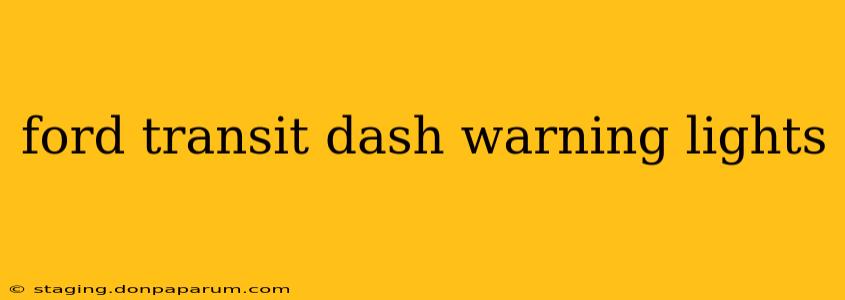Understanding your Ford Transit's dashboard warning lights is crucial for maintaining your vehicle's health and ensuring safe driving. This comprehensive guide will help you decipher those flashing symbols, allowing you to address potential issues promptly. We'll cover common warning lights, their meanings, and what actions you should take.
Common Ford Transit Dash Warning Lights and Their Meanings
Your Ford Transit's dashboard is equipped with a variety of warning lights, each indicating a specific system or component requiring attention. Ignoring these lights can lead to more significant problems down the line, potentially impacting your safety and the longevity of your vehicle.
Engine-Related Warning Lights:
-
Check Engine Light (typically an illuminated engine symbol): This is a broad indicator and could signal a multitude of issues, ranging from a loose gas cap to a more serious engine malfunction. It's crucial to get a diagnostic scan performed by a mechanic as soon as possible to pinpoint the exact problem. Don't ignore this light!
-
Oil Pressure Warning Light (typically an oil can symbol): This light indicates low oil pressure, a critical issue that can lead to severe engine damage if not addressed immediately. Pull over safely, turn off the engine, and check your oil level. Do not continue driving if the oil level is low or if the light remains illuminated.
-
Engine Temperature Warning Light (typically a thermometer symbol): This light alerts you to overheating. Pull over safely and let the engine cool down before attempting to diagnose the cause. Never open the radiator cap while the engine is hot.
Safety-Related Warning Lights:
-
ABS Warning Light (typically an ABS symbol): This light indicates a malfunction in the Anti-lock Braking System (ABS). While you can still brake, the ABS functionality is compromised. Have it checked by a mechanic as soon as possible.
-
Brake Warning Light (typically a brake symbol): This light usually indicates low brake fluid or a problem with the braking system. This is a serious issue requiring immediate attention. Check your brake fluid level; if low, you may have a leak.
-
Airbag Warning Light (typically an airbag symbol): This light indicates a problem with the airbag system. This could be a faulty sensor, a wiring issue, or a problem with the airbag itself. It needs professional attention.
-
Traction Control Warning Light (typically a skidding car symbol): This light indicates that the traction control system has been activated or is malfunctioning. It usually lights up when the vehicle's wheels lose traction.
Other Important Warning Lights:
-
Battery Warning Light (typically a battery symbol): This light typically signals a problem with your vehicle's charging system. It could be a failing alternator or a loose battery connection.
-
Low Fuel Warning Light (typically a fuel pump symbol): This one is pretty self-explanatory – it means you're running low on fuel.
-
Seatbelt Warning Light (typically a seatbelt symbol): This reminds you to fasten your seatbelt.
What to Do When a Warning Light Illuminates
The specific actions you should take will depend on the warning light that's illuminated. However, here are some general guidelines:
- Pull over safely if the warning light indicates a serious issue (e.g., oil pressure, engine temperature, brake warning). Do not continue driving under these conditions.
- Consult your owner's manual for more detailed information about the specific warning lights and their meanings.
- If you're unsure about the meaning of a warning light or the necessary steps to take, contact a qualified mechanic.
This guide provides a general overview of common Ford Transit dash warning lights. Remember that this information shouldn't replace professional advice. Always consult your owner's manual and a qualified mechanic for diagnosis and repair. Regular maintenance and prompt attention to warning lights will contribute significantly to the longevity and safety of your Ford Transit.

